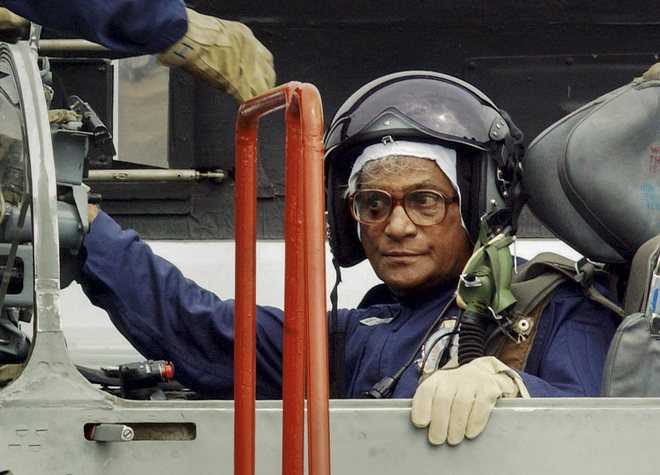
Ajay Banerjee
Tribune News Service
New Delhi, January 29
During his tenure as the Defence Minister, the late George Fernandes presided over Kargil war, oversaw one of the biggest post World War-II movement of troops and scientists working under his ministry conducted the second nuclear test at Pokhran in May 1999. He nudged the forces into modernising for the 21st century.
Fernandes, who passed away today, had two tenures—March 1998 to March 2001 and October 2001 to May 2004—as Defence Minister during the six-year (1998-2004) NDA regime led by BJP’s Atal Bihari Vajpayee.
At the beginning of his tenure, the nuclear test happened and India ended up with sanctions imposed by the US and faced an angry Japan—both ironically are quite close to India now.
During the Kargil war in 1999, Fernandes refused to accept the theory of intelligence failure and ordered the forces to throw out the Pakistani troops; India attained a moral victory. In New Delhi, the Ministry of Defence (MoD) rolled out one of biggest compensation packages for soldiers martyred in the war. Then came the biggest change as the MoD okayed addition of more troops in eastern Ladakh—Kargil is part of the Army’s Leh-based 14 Corps that was raised after the war.
In the aftermath of the attack on Parliament in December 2001, Indian forces launched ‘Operation Parakram’, the biggest movement of troops after World War-II (1939-45). The 10-month-long deployment that saw nuclear-armed neighbours India and Pakistan in an eyeball-to-eyeball scenario yielded some important military lessons.
From this was born the concept called ‘cold start’ that envisages the military to be ready to go to war at a short notice. The purchase of 126 MMRCA (medium multi-role combat aircraft) jets initiated during his tenure and so was the Scorpene submarine deal. It was in 1999 that the MoD okayed the artillery modernisation plan and the submarine action plan—both are being fructified now with the induction of new artillery guns and submarines.
Old timers remember that Fernandes had “earned” the sobriquet of a “Soldiers Minister”. Once during his more than 16 visits to Siachen, he ordered that mail be delivered to troops once a week, and not fortnightly.
In 2003 when the media was unkind to him over frequent MiG-21 crashes and dubbed the aircraft as a “flying coffin”, Fernandes undertook a sortie on the backseat of the jet to drive home the point these were safe.
